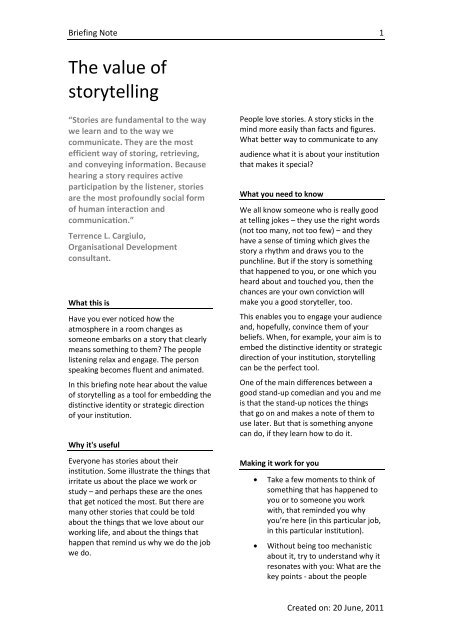The value of storytelling
View full briefing note (PDF 90 KB) - Distinct
View full briefing note (PDF 90 KB) - Distinct
- No tags were found...
You also want an ePaper? Increase the reach of your titles
YUMPU automatically turns print PDFs into web optimized ePapers that Google loves.
Briefing Note 1<strong>The</strong> <strong>value</strong> <strong>of</strong><strong>storytelling</strong>“Stories are fundamental to the waywe learn and to the way wecommunicate. <strong>The</strong>y are the mostefficient way <strong>of</strong> storing, retrieving,and conveying information. Becausehearing a story requires activeparticipation by the listener, storiesare the most pr<strong>of</strong>oundly social form<strong>of</strong> human interaction andcommunication.”Terrence L. Cargiulo,Organisational Developmentconsultant.What this isHave you ever noticed how theatmosphere in a room changes assomeone embarks on a story that clearlymeans something to them? <strong>The</strong> peoplelistening relax and engage. <strong>The</strong> personspeaking becomes fluent and animated.In this briefing note hear about the <strong>value</strong><strong>of</strong> <strong>storytelling</strong> as a tool for embedding thedistinctive identity or strategic direction<strong>of</strong> your institution.Why it's usefulEveryone has stories about theirinstitution. Some illustrate the things thatirritate us about the place we work orstudy – and perhaps these are the onesthat get noticed the most. But there aremany other stories that could be toldabout the things that we love about ourworking life, and about the things thathappen that remind us why we do the jobwe do.People love stories. A story sticks in themind more easily than facts and figures.What better way to communicate to anyaudience what it is about your institutionthat makes it special?What you need to knowWe all know someone who is really goodat telling jokes – they use the right words(not too many, not too few) – and theyhave a sense <strong>of</strong> timing which gives thestory a rhythm and draws you to thepunchline. But if the story is somethingthat happened to you, or one which youheard about and touched you, then thechances are your own conviction willmake you a good storyteller, too.This enables you to engage your audienceand, hopefully, convince them <strong>of</strong> yourbeliefs. When, for example, your aim is toembed the distinctive identity or strategicdirection <strong>of</strong> your institution, <strong>storytelling</strong>can be the perfect tool.One <strong>of</strong> the main differences between agood stand-up comedian and you and meis that the stand-up notices the thingsthat go on and makes a note <strong>of</strong> them touse later. But that is something anyonecan do, if they learn how to do it.Making it work for you• Take a few moments to think <strong>of</strong>something that has happened toyou or to someone you workwith, that reminded you whyyou’re here (in this particular job,in this particular institution).• Without being too mechanisticabout it, try to understand why itresonates with you: What are thekey points - about the peopleCreated on: 20 June, 2011
Briefing Note 2involved, about the circumstances– and what is incidental? What isthe emotional content – how didthe people in the story react tothe situation? This gives colour tothe mental picture you arecreating.• <strong>The</strong>se are the things that youneed to relay to listeners, if youare going to evoke in them thesame response that the originalincident evoked in you. Thisapproach also allows you tocondense the story intosomething you can tell quickly ifyou only have a few moments torelay it.• Practice telling it. See how itsounds. See how other peoplereact to it.• Change it. You can tell the samestory in different ways, dependingon who you are telling it to, andthe circumstances in which youare telling it.• Gather more stories. Notice andtake note <strong>of</strong> things that happen inyour working life.When you want to explain to someonewhy your institution is the one to choose– to study at, to invest in, to work for, topartner with – a story can say it all.Where to find out morePapers<strong>The</strong>re are a huge range <strong>of</strong> academicpapers on <strong>storytelling</strong> in organisations.Here are just a few:• Bate, P. (2004) <strong>The</strong> role <strong>of</strong> storiesand <strong>storytelling</strong> in organizationalchange efforts: <strong>The</strong> anthropology<strong>of</strong> an intervention within a UKhospital, Intervention Research 1(1) 27-42122-129• Mittins, M., Abratt, R., Christie,P.(2011) Storytelling inReputation Management: theCase <strong>of</strong> Nashua Mobile SouthAfrica, Management Decision 49(3)• Baker, W., Boyle, C. (2009) <strong>The</strong>timeless power <strong>of</strong> <strong>storytelling</strong>,Journal <strong>of</strong> Sponsorship 3 (1) 79-87• Boyce, M. E. (1996)Organizational story and<strong>storytelling</strong>: a critical review,Journal <strong>of</strong> Organizational ChangeManagement 9 (5) 5-26Books• Made to Stick: why some ideassurvive and others die, Chip Heath& Dan Heath, Random House,2007• Switch: How to change thingswhen change is hard, Chip Heath& Dan Heath, Random House,2010• <strong>The</strong> leader's guide to <strong>storytelling</strong>:mastering the art and discipline <strong>of</strong>business narrative, StephenDenning Jossey-Bass, 2005Internet• GovLeaders.org is a free on-lineresource designed to helpgovernment managers cultivate amore effective and motivatedpublic sector workforcehttp://govleaders.org/<strong>storytelling</strong>.htm• Denning, S. (2004) Telling Tales,Harvard Business Review, 82 (5)Created on: 20 June, 2011
Briefing Note 3• ‘Get Storied’ is a consultancy thathas made a business out <strong>of</strong>encouraging and teachingbusinesses how to use<strong>storytelling</strong>. Read their businesscase for <strong>storytelling</strong>:http://www.getstoried.com/2010/01/27/the-business-case-for<strong>storytelling</strong>/Guest authorRob Woods, Woods Training Ltd. Trainingand consultancy for fundraising teamswww.woodsconsultancy.co.uk/External expertise• Rob Woods, Woods Trainingwww.woodsconsultancy.co.uk/courses.html, contributor to theCASE Online training series:www.case.org/Conferences_and_Training/Online_Speaker_Series_-_Storytelling.html (accessedJanuary 2011)• Tony Quinlan, Narratehttp://narrate.typepad.com/about.html, contributor to CASEEurope’s communicationsseminar:http://www.case.org/Conferences_and_Training/Strategic_Internal_Communications_.html(accessed March 2011)In-house expertise• Consider who in your institutionmight have these skills. Forexample, a lecturer in journalism,creative writing or theatrestudies.Find out morewww.distinct.ac.uk has a growingresource section.Get involvedIf you have a case study, report, orother resource you would like to sharewith colleagues in the sector we wouldlove to hear from you. Please contactus at:contact@distinct.ac.ukIf you would like to distribute thiscontent please contact the projectteam.© 2011 Distinct in Higher EducationCreated on: 20 June, 2011





